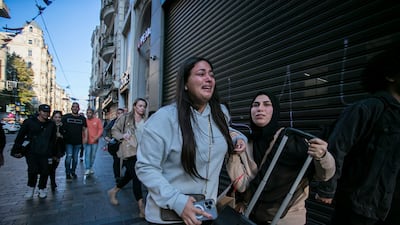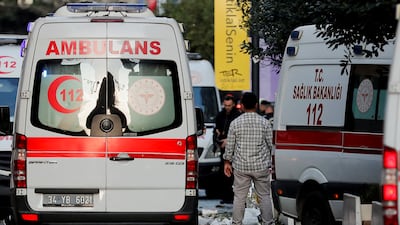Growing up in Syria's impoverished north-east in the 1980s, Hosheng Ossi dreamt of joining Kurdish militants fighting for autonomy in Turkey.
Now living exile in Belgium, where he was given asylum, the Syrian-Kurdish poet and novelist says he faces mounting death threats from the same group he once championed, the Kurdistan Workers' Party (PKK).
The Marxist-Leninist group originated in Turkey but has a military presence in Syria and Iraq. Turkey accuses it of carrying out the Istiklal Avenue bombing this week in Istanbul, which killed six people.
Turkish officials say the order for the attack came from the PKK in Kobani, or Ain Al Arab, a city in northern Syria controlled by the Kurdish Protection Units (YPG), a sister militia of the PKK. Both groups denied any link to the Istanbul bombing.
Mr Ossi points out the timing of the bombing, coming as talks were under way between Turkish President Recep Tayyip Erdogan's Justice and Development Party (AKP) and the Peoples’ Democratic Party (HDP), which the government has accused for years of acting as a political extension of the PKK.
“Erdogan benefits electorally from making such accusations, which cannot be ascertained,” says Mr Ossi. “At the same time PKK involvement cannot be ruled out.”

















Mr Erdogan is seeking HDP support for an amendment that enshrines the right of women in the country's secular constitution to wear the hijab.
A potential rapprochement, Mr Ossi says, undermines the PKK, which regards itself as the ultimate power in Kurdish politics.
It has also angered Turkish ultranationalists, who form part of Mr Erdogan's governing coalition and vehemently oppose the HDP.
“A deal does not suit hardliners on the two sides,” Mr Ossi says.
His trajectory from PKK stalwart to one of the group's most vocal opponents represents a current of peaceful opposition to the Kurdish militias, which captured large parts of northern and eastern Syria in the past decade.
Rights groups say the militias are responsible for deadly suppression of civil movements in the areas they control, from which they carved an autonomous region in 2014 and called Rojava.
It constitutes large parts of the Euphrates valley, the country's most resource-rich area, and the centre of the American sphere of influence in Syria, underpinned by 1,000 troops and a proxy militia called the Syrian Democratic Forces, which is led by the YPG.
In text messages and dedicated Facebook accounts, as well as websites linked to the PKK, Mr Ossi is accused of “betraying the blood of the martyrs” for criticising Kurdish management of north-eastern Syria and what he describes as PKK dominance.
He is also accused of being on Turkey's payroll and of undermining the cause of Kurdish self-determination.
But the threats have not been issued directly by the group.
“When the PKK targets you, the bullet will not come with a PKK letterhead,” says Mr Ossi, a Kurd from the border town of Darbasiyah in eastern Syria.
The ascendancy of the PKK

Most of Syria's Kurds lived in the north-east before the 2011 revolt against five decades of Assad family rule. The region produced most of Syria's 300,000 barrels per day of oil and accounted for most of the country's wheat and cotton crops.
The PKK's ascendancy there traces its roots to support from Hafez Al Assad, who armed the group until the late 1990s, on the condition it attacked only Turkey and did not espouse the cause of Syria’s Kurds.
Under the threat of Turkish invasion, Assad cut support for the group in the 1998 and expelled its leader, Abudllah Ocalan. Ocalan has been serving a life sentence in an island prison in the Sea of Marmara for the past two decades.
But as soon the Syrian revolt started in 2011, the regime re-established links with the PKK to help it crush the peaceful uprising. Relations also warmed between the PKK and Iran, the regime's main regional backer.
The PKK and the regime saw an opportunity to re-embrace each other, says Mr Ossi, who was working at that time as a producer at Roj TV, a PKK-funded station in Denderleeuw, Belgium.
He says lawyers of Ocalan relayed instructions from their client to “reopen channels with the Syrian regime”.
“This is a tyrannical regime that is killing the people,” Mr Ossi says. “Some of us went crazy. How could Ocalan demand such a thing?”
Expansion
As central authority weakened, Kurdish paramilitary forces led by PKK commanders took over north-eastern regions and later captured more areas from Arab rebels who were fighting the Assad regime.
But the PKK's decades-long status as a terrorist organisation in the US and the rest of the West, as well as Turkey, was a complicating factor when Washington needed Kurdish militia power to fight ISIS, which expanded from Iraq to eastern Syria, in 2014.
The following year, the US coalesced Kurdish militias and Arab auxiliaries into the Syrian Democratic Forces, based in Rojava, without Washington recognising any links between the YPG and the PKK.
Turkey, however, cited PKK expansion as prompting its incursions into Syria. The Turkish military and its Arab militia proxies overran areas held by Syrian Democratic Forces and established several buffer zones near the border, starting in 2018.
An email request for comment by The National to the US Central Command on how much sway the PKK retains in the American sphere of influence was not answered. Although ISIS was defeated in 2019, the US military and the SDF still conduct operations against ISIS remnants in the area.
Cannon fodder
Mr Ossi has also invited the PKK's wrath by describing on his Facebook and YouTube feeds, as well as in public lectures, rising tension between Syrian-Kurds, who lost great numbers in the fight against ISIS, and Turkish PKK commanders he describes as de facto rulers of the north-east.
He says the 10,000 to 15,000 people killed in the fighting on the Kurdish side were mostly Syrian, who “gave the PKK the most and received nothing”.
“The PKK exhausted the Syrian-Kurds, pillaged their resources and talents and is still doing so,” he says, referring to forced conscription in the north-east.
Hundreds of millions of dollars a year worth of oil is being produced in the area under US military protection, making Rojava “the spinal cord of the PKK's nervous system”.
“It is crucial for them to remain de facto in power in Rojava,” he says. “Like the Assad regime, the PKK has planted fear in Syria’s Kurds."
He is referring to dozens of peaceful opponents of the PKK whom international human rights organisations say were killed or disappeared in the north-east in the 13 years.
Changing international alliances, however, could undermine the militias' territorial gains. In the past three months, Turkey said it had no conditions for talks with the Assad regime and hinted it could support a strong central government in Damascus and restore diplomatic ties.
“It looks like the PKK could reap nothing politically from its improved security ties with America and return to its caves,” Mr Ossi says, referring to the group's main base in the Iraqi mountains on the border with Iran.
Sharp transformation
When he was young, Mr Ossi, now in his 40s, was not opposed to PKK violence.
He initially wanted to join the PKK as a fighter but his eyesight was poor. He had a flair for writing and his friends in the group told him he could serve the party in this way.
He became one of the few Kurdish names who appeared regularly in the Arab press.
His columns espousing the PKK and denouncing Turkey were tinged with criticism of the regime in Damascus, eventually forcing him to flee Syria in 2009. The PKK smuggled him to Turkey and he ended up in Belgium.
His break with the PKK came in October 2011, when he said it became clear to him that the PKK was coordinating with the regime to suppress the peaceful protest movement against Asaad.
Even PKK loyalists, who stayed fervently supportive of the group but were sympathetic to the revolt, were not spared the killings and kidnappings, Mr Ossi says.
He describes one alleged encounter in Rojava in which a Turkish PKK commander threatened to gouge out the eyes of Syrian SDF cadres if they diverged from the PKK.
“They do not tolerate even their own if they show signs of being anti-Assad,” he says.
Mr Ossi writes poetry in Arabic and Kurdish. His novel, The Plight of the Questions and the Lust of Imagination, won the 2017 Katara Prize, an Arabic literary award.
The novel traces the life of a fictional ex-Syrian officer, an Alawite, who marched in pro-democracy demonstrations at the start of the Syrian revolt, a rarity among the sect that has dominated Syria since Alawite officers took power in a 1963 coup.
The regime arrested, tortured and killed him, and his organs ended up being sold in Europe. Those who received the organs embarked on a quest to identify the donor, with the help of an Armenian. Shortly after they found out and wanted to document the life of their saviour, they died in a car accident.



